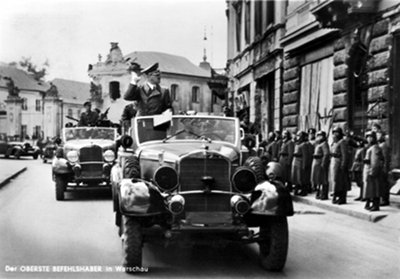Oops — Hitler!
A Surprise in Context
A surprise
So I was sifting through packs of old postcards the other evening, mostly of two kinds: cards to and from family members on vacations or business trips, and attractive landscapes and city scenes bought as souvenirs but which no one ever had gotten around to mailing. After doing this for some time, setting aside several cards that might be interesting illustrations for Troynovant, I came upon a card and said inadvertently,
"Oops — Hitler!"
Now, you saw that coming, since you could hardly be reading down this page without having seen its title. But I hadn't, and neither had my wife Jennifer, who looked up from her nearby chair and remarked that "oops" and "Hitler" are two words you rarely hear in conjunction.
That's certainly true: it's an unusual remark in any context, postcards or anywhere else. Even in our own history-suffused household and conversation, in the presence of a number of books relating to World War II and its ramifications, I'd never spoken that odd miniature phrase before, and I doubt it ever had crossed my mind in thought, hearing, or reading. But it seemed appropriate at the moment.
I explained to Jennifer that this particular postcard (showing it to her), a photograph of Adolf Hitler parading in triumph along a street in captured Warsaw early in World War II, was not a to-or-from-family card, but one I'd purchased from a stamp dealer years before. It's a historically characteristic photo of Hitler enjoying a major victory — although not in the thick of adoring crowds as in many parades in prewar and even wartime Germany. The street is thinly lined with Wehrmacht soldiers who obviously were ordered to stand there and look military; there are very few Polish civilians.
 Well, the surprise at finding a figure, recognizing a pictured personage where one didn't particularly expect it, turning over postcards, is rather mild: hence my bemused exclamation. But the surprise in the 1930s and 1940s as step by step, Germany and then Europe and then the whole world realized who Adolf Hitler was and what he stood for — lie and rabble-rousing and remilitarization and annexation and Blitz and Occupation and Total War and Holocaust — that was a painful progress of years, as was his eradication. For long years the witnesses' humor was whistling through the shellfire; and the victims' humor, hardly even that.
Well, the surprise at finding a figure, recognizing a pictured personage where one didn't particularly expect it, turning over postcards, is rather mild: hence my bemused exclamation. But the surprise in the 1930s and 1940s as step by step, Germany and then Europe and then the whole world realized who Adolf Hitler was and what he stood for — lie and rabble-rousing and remilitarization and annexation and Blitz and Occupation and Total War and Holocaust — that was a painful progress of years, as was his eradication. For long years the witnesses' humor was whistling through the shellfire; and the victims' humor, hardly even that.
Winston Churchill recognized Hitler far earlier than most, and was vilified for speaking out by those who later were sorry, or ought to have been. We're now past Naziism and the struggle against it in World War II; but we must never forget. The sophistication of our history depends on knowing how we got here; the maturity of our cultural self-understanding requires it; the survival of our civilization into the future requires it.
Sometimes it is cathartic, after a suitable interval, to laugh at disaster and tragedy. Mel Brooks' film The Producers (1968), with Zero Mostel and Gene Wilder, and Dick Shawn as the addled pigeon-fancier Wehrmacht survivor, is a superb example, full of outrageous little surprises. Not in every historical case, and not to override serious discussion; but certainly sometimes it helps to laugh at a villain, especially such a one as Adolf Hitler who glossed dreadfulness with his ostentatious strutting and bombast.
Back to the postcard of the streets of Warsaw. Who is this victory parade for? Aside from Hitler himself and some Wehrmacht officers and Nazi Party bureaucrats in the automobiles and their ilk elsewhere, who really has benefitted from Nazi dictatorship and aggressive war, in Germany or Poland? Even many of those dutiful victorious soldiers standing along the roadside would die in the next few years, along with millions upon millions more, soldiers and civilians too. Who saw all that coming, and who chose it?
Oops — Hitler!
© 2012 Robert Wilfred Franson
On laughing too early:
Hitler's Shattered Dream, 1932
by R. W. Franson
Prerequisites for the partition of Poland:
Nazi-Communist Partnership
Elective Affinities, Offensive Alliances
by R. W. Franson
Who would know Hector, if Troy had been happy?
By public ills was the way of virtue builded. — Ovid
The Migration of the Warburg Institute
from Hamburg to London, 1933
The page for this particular postcard:
Hitler in Warsaw; Birthday in Krakau
Postcard, 20 April 1941
R. W. franson's review of
Berlin Diary
The Journal of a Foreign Correspondent
1934-1941
by William L. Shirer
Germany at Troynovant
Prussia, Bavaria, Austria,
Imperial Germany, Third Reich
Postcards by Title
flat-carded Scenes of Passage:
in the older manner sent & reviewed in Private
though carried by the Public post
| Troynovant, or Renewing Troy: | New | Contents | |||
| recurrent inspiration | Recent Updates | |||
|
www.Troynovant.com |
||||
|
Essays:
A-B
C-F
G-L
M-R
S-Z
|
||||
| Personae | Strata | Topography | |
|
|||